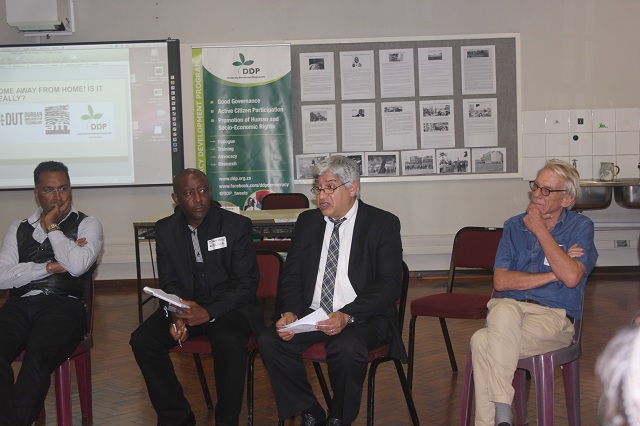The human capacity to construct “the other”, the idea that they are somehow different and superior to another human being is at the heart of the violent xenophobic attacks which gripped certain areas of the eThekwini Municipality, including its central business district.
This was the argument of Professor Ahmed Bawa, Vice-Chancellor and Principal at DUT, during a seminar organised by DUT’s Art For Humanity and the Democracy Development Program at the University’s City Campus last night (Tuesday, 15 April 2015).
Until Tuesday (15 April 2015), the violence – which has been dubbed “Afrophobia” by the country’s Police Minister Nathi Nhleko – had been restricted to eThekwini townships and informal settlements. Following it spreading to parts of the City, large retail shops in Dr Pixley KaSeme (former West) Street and fast food restaurants in Mahatma Gandhi (former Point) Road closed their doors.
“Let me begin with a disclaimer. I’m definitely not an expert on xenophobia. What you’ll hear today are some thoughts that I have about this really challenging situation that we find ourselves in,” said Prof Bawa.
According to Prof Bawa, the xenophobic attacks represent one of the most serious challenges South Africa has faced since 1994. “This isn’t an aberration. It’s not a spontaneous outbreak. I think there are some deep seated issues that we have to deal with and we aren’t working hard enough as a society to address them (deep issues),” he said.
“This capacity to construct something that we might call ‘the other’ is at the heart of this and it’s really concerning. We try to think of ourselves as ‘us’ and ‘them’ and it’s a very serious issue. An example us of this is a case which happened in New Brighton (Port Elizabeth) in the late 90s. There was an incident of fighting in the township and three people died. A local tabloid newspaper reported the matter, saying: two men and a Venda were killed this weekend. I’m sure you get my drift. We have to think quite hard about the race and ethnic dynamics within our society. It’s not just about what’s happening with foreign people today, it goes deeper than that,” he said.Prof Bawa also spoke about apartheid being a contributing factor to the xenophobic violence, saying it (apartheid) was a “terribly violent and devastating system” and many South Africans, including today’s youngest children, still live with the scars of the now defunct system. “In some respect, what would have been a very good investment by our government (of post 1994) would have been to make money available for everyone to go through some process of engagement, a catharsis where we could all unburden ourselves. We tried of course with the Truth and Reconciliation Commission but it didn’t go the whole way unfortunately and there were reasons for that,” he said.
Prof Bawa also said xenophobia is not limited to poverty stricken communities, but existed across classes and countries, even those with high levels social cohesion. On a possible solution to the violence, there is no silver bullet, said Prof Bawa. “Obviously, if people are assaulting other people, if there’s stealing, murder, and so on, the law must take its course. But that’s not the solution. We have to think about it (a solution) in a much more serious way,” he said.
“…we can’t blame everything on the past, we have to move forward. One of the things we have to begin to think about is how do we begin to think about constructing a dominant South African identity. We’ve been lazy as a nation not to think about that. We need big national projects which will galvanise us around a new vision of a society that we think we should be. We should be thinking of a set of national projects that will galvanise universities, schools, teachers, business sector, and so on, for national projects that will give us purpose so that we can start defining ourselves as a nation,” said Prof Bawa.
– Sinegugu Ndlovu
Pictured: Professor Ahmed Bawa (second from right), speaks his mind about the current xenophobic attacks.


